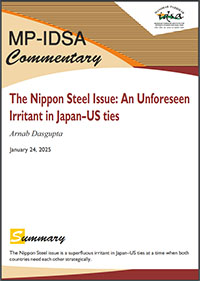The Nippon Steel Issue: An Unforeseen Irritant in Japan–US ties
- January 24, 2025 |
- IDSA Comments
Japan’s relationship with the United States has been the bedrock of East Asian international order after 1945. It has served as the cornerstone of Japan’s foreign and security policy, freeing up its energies for economic growth and development. As such, Japan–US ties have generally been as deep as they have been broad, with partnerships across a host of sectors moving forward in different registers. In this context, Japanese national steelmaker Nippon Steel’s acquisition of the US’ national steel concern US Steel should have been a tricky, but possible, development.
Since it was first announced in early 2023, the acquisition attracted significant media attention, as it would make Nippon Steel the second-largest steelmaker in the world, while placing a non-trivial share of steel production in the US under the direction of a key strategic ally.[i] However, the surprisingly strong opposition to the deal within the US, and President Joseph Biden’s susceptibility to the opposing rhetoric, not only indicates the rise of new forces within the US, but also creates a massive, and superfluous, irritant in ties between Japan and its key security guarantor.
Timeline
US Steel had been ailing financially for some time before it announced its intention to open itself up for acquisition. The national steelmaker was outcompeted, first by Japan in the 1970s, then by China and others in the 1980s and 1990s, causing it to shrink to 27th place worldwide in terms of production.[ii] In August 2023, it became the target of a bidding war when two American companies sought to acquire it. At the time, US Steel management decided to turn down rival offers to instead accept Nippon Steel’s offer, which offered a 40 per cent premium over the stock value of the former.[iii]
On 18 December 2023, when the deal was finalised, it was decided that the US$ 14.9 billion purchase would place US Steel in a relationship of subsidiarity with Nippon Steel, but would otherwise retain all the trappings of its existence, including its name, headquarters and production plants. The deal also guaranteed that Nippon Steel would honour all agreements made between the management of US Steel and the powerful United Steel Workers (USW) trade union, including guaranteed collective bargaining and wage negotiations.[iv]
The news provoked a firestorm of controversy in the US, spilling over into national politics as Biden and Vice-President Kamala Harris headed into elections against President Donald Trump. To his Japanese interlocutors’ shock, Biden came out against the deal. On 21 December 2023, senior officials within the Biden administration publicly cautioned that the deal ‘appears to deserve serious scrutiny’.[v] On 14 March 2024, the administration declared that it would block the deal if it went through, citing ‘national security interests’ which it never subsequently clarified.[vi] In April, US authorities commenced antitrust investigations against both steelmakers, but ended up failing to reach consensus.[vii]
Nevertheless, by September 2024, it became clear that Biden would be blocking the acquisition. Observers believed that he was guided in this decision by the prospect of electoral gains, as the USW, aided and supported by Trump and his allies, staunchly opposed the acquisition. Despite Nippon Steel delaying its takeover decision to late 2024, and Harris’ electoral defeat to Trump, the inevitable hammer came down on 3 January 2025, as President Biden, in one of his last acts as President, blocked the deal via an executive order.[viii] As of the time of writing, both Nippon Steel and US Steel have sued the US Government in court.[ix]
The Japanese Government’s Role
It is interesting to note here that the Government of Japan changed its stance on the matter in the wake of its own electoral transition, arguably causing the issue to attain unwarranted diplomatic significance. Prime Minister Fumio Kishida explicitly distanced Tokyo from the negative implications of the deal. During his state visit to the US in April 2024, he restricted himself to noting only that he hoped the outcome of the deal would be ‘positive for both sides’.[x]
However, Shigeru Ishiba, upon his appointment as Prime Minister in October, took a more active stance on the issue, publicly requesting the Biden administration to reverse its position.[xi] This activism has had the unfortunate side-effect of tying Prime Minister Ishiba’s reputation (and possibly Japan’s) to its failure, which is concerning given the fragile position Ishiba himself is in domestically.
As it stands, Ishiba now finds himself faced with a choice of whether to climb down from a declared diplomatic position or to fully commit to it by supporting Nippon Steel’s legal challenge. Complicating his decision is the fact that his counterpart will be President Trump, an out-and-out skeptic of the deal (and international trade as a whole) who has very publicly committed to not allowing any foreign investment which he feels ‘takes advantage of’ American capabilities.
Implications
The tussle over US Steel demonstrates clearly that resorting to economic protectionism in American politics is a matter of bipartisan consensus. As scholars have pointed out, the US, despite its role as underwriter of the international economic order in the wake of the Second World War, never actually relinquished its protectionist prerogatives.[xii] In fact, it strove to include the famous ‘national security clause’ into the General Agreement on Trade and Tariffs (GATT), which formed the bedrock of today’s international trade system.
Commentators may be correct in pointing out that the US treatment of Nippon Steel—and by extension Japan—does not make sense from a strategic perspective. This does not detract from the fact that both US parties have seen fit to indulge in trade protectionism when the electoral mood demands it. It raises serious questions about the diplomatic preparedness of the Japanese, who seem to have underestimated the continued salience of economic nationalism among the American populace despite having previously been at the receiving end of it during the ‘Japan-bashing’ era of the 1980s.
Indeed, Japan is not so different. Even as it protested against Biden’s actions in late 2024, its economic security minister (apparently without a trace of irony) argued before the media that the acquisition bid for convenience store chain Seven-Eleven by Canadian supermarket chain Couche-tard could not go ahead because the former was ‘important to national security’.[xiii] The fact remains that Japan itself has benefitted from the national security exception to GATT, and its domestic laws contain many of the same provisions the US is being accused of having misused.[xiv]
The protections it affords to its agricultural sector has been a constant source of criticism from observers, while anecdotal stories of how foreign ski makers were barred from Japanese markets by Tokyo with the excuse that Japanese snow was apparently of higher quality than abroad remain accessible within the scholarly and popular record. It is, therefore, not certain whether Japan would be able to long sustain a critique of US protectionism, especially when President Trump, who has been a long-time opponent of Japanese trade policy, would be more than happy to remind American audiences of Tokyo’s own sins in that domain.
Conclusion
As to what happens next, it is possible that Nippon Steel may be persuaded to pursue legal recourse to a limited extent before withdrawing its bid in the interest of broader ties. Indeed, prudence demands that it be so, as continuing to draw attention to the matter under President Trump may serve to widen fissures between Tokyo and Washington at a time when the former needs the latter not only to manage China’s ever-present challenge to the region, but also to salvage viable trilateral cooperation with Seoul in the wake of President Yoon Suk-yeol’s coup attempt in December 2024. Prime Minister Ishiba must also introspect on whether he has the political bandwidth to engage the US under Trump in a trade war over one individual business negotiation. At present, the best course of action would seem to be for both sides to return to the drawing board and attempt to contain the damage the economic domain can cause to broader bilateral relations.
Views expressed are of the author and do not necessarily reflect the views of the Manohar Parrikar IDSA or of the Government of India.
[i] Louis Leonardi, “Forging Ahead: Nippon Steel’s $14.9 Billion Acquisition of U.S. Steel and Its Impact on the Global Market”, Michigan Journal of Economics, 14 May 2024.
[ii] “Nippon and US Steel Challenge Blocked Takeover”, MEPS International, 6 January 2025.
[iii] Joel Griffith, “Nippon Acquisition of U.S. Steel”, Commentary, The Heritage Foundation, 22 April 2024.
[iv] “Nippon and US Steel Challenge Blocked Takeover”, no. 2.
[v] Zeke Miller and Fatima Hussein, “Biden Believes U.S. Steel Sale to Japanese Company Warrants ‘Serious Scrutiny,’ White House Says”, Associated Press, 22 December 2023.
[vi] Trevor Hunnicutt and Alexandra Alper, “Biden Says U.S. Steel Must Stay Domestically Owned, a Major Blow to Nippon Steel”, Reuters, 16 March 2024.
[vii] Fatima Hussein, Josh Boak and Marc Levy, “Biden Blocks $14 Billion Acquisition of US Steel by Japan’s Nippon Steel”, Reuters, 4 January 2025.
[viii] Ibid.
[ix] “Nippon and US Steel Challenge Blocked Takeover”, no. 2.
[x] Jennifer Jett and Megan Lebowitz, “The U.S. and Japan Announce Historic Upgrade in Security Ties to Counter China”, NBC News, 10 April 2024.
[xi] Tim Kelly, David Dolan and Aishwarya Jain, “Exclusive: Japan PM Ishiba Urges Biden to Approve Nippon-US Steel Deal, Sources Say”, Reuters, 26 November 2024; Noriyuki Hirata, Yuka Obayashi and Katya Golubkova, “Nippon Steel Could Face Growth Challenges After U.S. Steel Purchase Blocked, Analysts Say”, Reuters, 7 January 2025.
[xii] Nancy Williams, “The Resilience of Protectionism in U.S. Trade Policy”, Boston University Law Review, Vol. 99, No. 2, 2019, pp. 704, 719.
[xiii] AFP-Jiji, “Japan to Consider ‘Economic Security’ in 7-Eleven Takeover”, The Japan Times, 10 January 2025.
[xiv] Tomoko Ishikawa, “Investment Screening on National Security Grounds and International Law: The Case of Japan”, Journal of International and Comparative Law, Vol. 7, No. 1, pp. 81–84.






